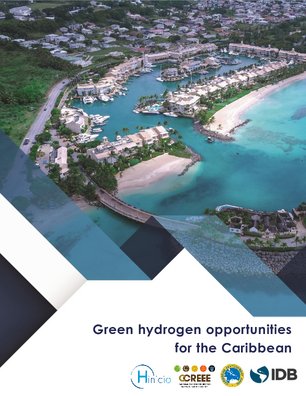Green Hydrogen Opportunities for the Caribbean
Date
Dec 2022
The decarbonization of the energy, transport, and industrial sectors is an essential part of achieving net-zero CO2 emissions, to limit global warming to 1.5C above pre-industrial levels. Green hydrogen is emerging as one of the most versatile climate change mitigation tools, since it poses a unique potential to decarbonize hard-to-abate sectors, such as freight transport, energy-intensive industries, and power systems highly dominated by fossil fuels. It also holds an alternative to produce fuels and chemical feedstock locally, using renewable energy without dependency on imported fuel, energy, or commodities. The Caribbean has defined as a priority its aim to enhance its energy security with resilient and low-carbon technologies while improving reliability, affordability, and sustainability of energy services. This report aims to contribute to the ongoing discussion on the role that green hydrogen can play to support the achievement of these goals and to provide an overview and guide for decision-makers in this area. Even though hydrogen is currently expensive for most applications at a global level, the exponential decrease in renewable energy costs in the last decade and the expected accelerated cost reduction of hydrogen technologies in the upcoming years are projected to drive an increase in the attractiveness of green hydrogen worldwide. As Caribbean countries are in the early stages of developing their renewable energy potential, there are opportunities to keep the cost decline of renewable energy production, enabling green hydrogen to get closer to achieving cost-competitiveness and could eventually become economically viable and a more broadly adopted solution.




